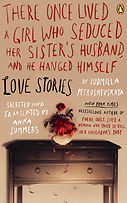
Ludmilla Petrushevskaya was born in Moscow in 1938. Petrushevskaya studied journalism at Moscow State University, and began writing prose in the mid ‘60s. Her first work was published in 1972, only to be followed by almost ten years of officially enforced silence, when the publication of her plays and prose was forbidden. At that time Petrushevskaya earned her living by working as a radio and television journalist and contributing to newspapers and literary magazines. When her somber and disturbing absurdist plays were finally staged, Ludmilla Petrushevskaya became widely recognized as one of Russia’s finest playwrights.
A collection of short stories and monologues, Immortal Love, was published in 1988 and met with stunning success among readers and critics alike. In 1992 Petrushevskaya’s novel The Time is Night was short-listed for the Russian Booker Prize; it was translated into more than 30 languages and included in college courses as one of the most important novels of the 20th century. Since then, Petrushevskaya has published over 30 books of prose. Today, award-winning plays by Petrushevskaya are produced around the world, while her prose pieces have been published in more than 30 countries. Ludmila Petrushevskaya is considered to be the only indisputably canonical writer currently at work in Russia today.
Ludmilla Petrushevskaya’s recent publications have established her reputation with a new generation of readers as a master of the mystical thriller and short stories of magical realism. The New York Times bestseller There Once Lived a Woman Who Tried to Kill Her Neighbor’s Baby: Scary Fairy Tales (published by Penguin in 2010) won the World Fantasy Award and was one of New York magazine’s Ten Best Books of the Year and one of NPR’s Five Best Works of Foreign Fiction.
In 1991, Petrushevskaya was awarded the Pushkin Prize by the Alfred Toepfer Foundation in Germany. She has also received prizes from the leading literary journals in Russia.
Petrushevskaya’s novels The Time is Night and Number One... were short-listed for the Russian Booker Prize. In 2002, Petrushevskaya received Russia’s most prestigious prize, The Triumph, for lifetime achievement. Petrushevskaya’s play Bifem was awarded the first prize at the New Drama Festival in 2003. In 2003 Ludmilla Petrushevskaya was awarded the State Prize of Russian Federation, in November 2021 Petrushevskaya publicly turned down this prize in protest against an imposed closure of The Memorial human rights organization. The World Fantasy Award was received in 2010 for the short stories collection published by Penguin in USA. In 2018 Petrushevskaya received The Big Book Award for life-time achievement, in 2019 the author was awarded New Literature Award (NOS), in critics’ choice nomination. The national drama recognition award The Golden Mask has been awarded to Petrushevskaya in 2020 for life-time achievement.
In 2022 Petrushevskaya continued to reside in Russia while fearlessly and severely protesting against dictatorship.
One of Russia’s best living writers.
— New York Times
We are likely to hear a lot more of his woman. Some October, perhaps, from the Nobel Prize committee.
— Nation
Petrushevskaya is a strikingly original author.
— The Guardian
…a strong talent.
— Kirkus Review
In her best work Petrushevskaya steers a sure course between neutrally recording the degraded life of the Soviet-era urban underclass and ratcheting up the squalor of that life for the mere pleasure of it. She does so by the steadiness of her moral compass and the gaiety of her prose.
— J. M. Coetzee, winner of the Nobel Prize in Literature
Thrillingly strange...Brilliantly disturbing...proves that the literary tradition that produces Dostoevsky, Gogol, and Babel is alive and well…Petrushevskaya writes instant classics. – The Daily Beast
Petrushevskaya is the Tolstoy of the communal kitchen. . . . She is not, like Tolstoy, writing of war, or, like Dostoevsky, writing of criminals on the street, or, like poet Anna Akhmatova or novelist Aleksandr Solzhenitsyn, noting the extreme suffering of those sent to the camps. Rather, she is bearing witness to the fight to survive the everyday. . . . [She is] dazzlingly talented and deeply empathetic. — Slate
The writing is beautifully controlled and the spirit large... She deserves a wide readership. – TLS
The auras of Samuel Beckett and the baleful Albanian magic realist Ismail Kadare blend in Petrushevskaya’s work. — Booklist
Selected books
Bibliography
2022 — Queen Lear. Magical Tale, short stories
2020 — The Wedding Night, Or May 37th, plays
2017 — Kidnapped. A Story in Crimes, novel
2017 — Travels On the Occasion of Death, novella, short stories
2013 — There Once Lived a Girl Who Seduced Her Sister’s Husband And He Hanged Himself – short stories
2010 — There Once Lived a Woman Who Tried to Kill Her Neighbor's Baby, short stories
2006 — The Little Girl From the Metropol, autobiography
2004 — Number One or In the Gardens of Other Possibilities, novel
2002 — A Black Coat, short stories
2020, 2015 — Piglet Pyotr, children’s picture books
1999 — Real-Life Tales, short stories
1996 — The Collected Works, 5 volumes
1992 — The Time is Night, novel
1988 — Immortal Love, Amazon Bestseller in translated fiction
Literary awards
Shortlisted for the Russian Booker Prize 1992
The Triumph Prize 2002
The New Drama Festival, first prize, 2003
The State Prize of the Russian Federation 2003
Shortlisted for the Russian Booker Prize 2004
The Gogol Prize 2008
The Bunin Prize 2008
The World Fantasy Award 2010, USA
Finalist of The National Book Critics Circle Award 2017, USA
The Big Book Award 2018 (for the life-time achievement)
The New Literature Award 2018 (Critics’ Choice)
The Golden Mask Award 2020 (for the life-time achievement)






